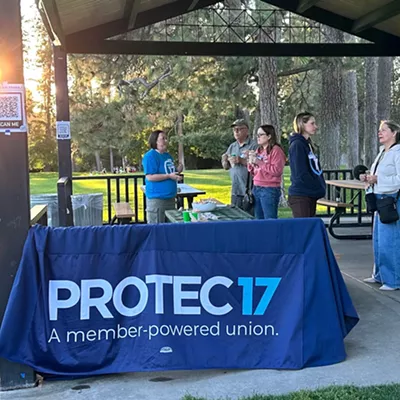On Oct. 29, 2020, Spokane's Health Officer Dr. Bob Lutz was abruptly fired by his boss at the Spokane Regional Health District, Administrative Officer Amelia Clark.
The public was outraged.
The firing came as the pandemic was growing in severity and schools were still operating remotely, as were many workplaces. Lutz had taken heat from those who wanted to end restrictions on daily activities, but he was widely respected by public health workers for trying to limit the spread of the deadly virus.
Among those who questioned his firing was Erika Henry.
Like many others shocked by the news on Oct. 30, Henry sent her thoughts to the local health board. But Henry's message would later stand out, because even though she hadn't included her title in the email sent from her personal account, some of the recipients learned she was acting assistant secretary for the Washington State Department of Health's Emergency and Preparedness Response program.
In the email, Henry lambasted Clark and admonished the health board members, telling them "you let an insecure weakling of a leader strong arm you into ousting him based on vague claims of what...personality conflict? Tell her to grow up and do her job."
Henry went on to defend Lutz's choices during the pandemic and said that firing him endangered the health of the public. She wrote that the health board could still "right this wrong," while warning that the consequences would "ripple for months."
Henry was right about the ripples.
Clark didn't have the authority to fire Lutz without first holding a public hearing before the local health board. It wasn't until the next week that the board voted 8-4 to fire him. The fiasco triggered a state investigation and multiple lawsuits. Clark no longer works at the district.
And about seven months after sending that email, Henry would be fired from her job with the state Department of Health.
Now, as Henry fights in U.S. District Court to argue she was wrongfully terminated and her state and federal free speech rights were violated, her case could call the Washington State Constitution into question.
While the state constitution says that "every person may freely speak, write and publish on all subjects, being responsible for the abuse of that right," the state Attorney General's Office, representing the Department of Health and its staff, is arguing that there's no "cause of action" to seek monetary damages if that right is violated.
Depending on the outcome of that argument, Henry's attorney Marcus Sweetser says the state constitution could be rendered "effectively toothless when it comes to protecting our rights."
But Brionna Aho, spokeswoman for the Attorney General's Office, says that "Washingtonians have the right to assert their constitutional rights in court when they feel those rights are violated," just not a mechanism to fight for financial relief.
Before sending her Oct. 30, 2020, email from personal equipment on personal time, Henry checked with legislative advisers at the Department of Health to ensure she was allowed to voice her concerns to local government officials as a private citizen. Without reading the message, they told her she could.
So, she hit send.
Months went by. Then, in early February 2021, Henry met the new state Secretary of Health Dr. Umair Shah and the two went to the Spokane Regional Health District for a meeting.
Before Shah and Henry arrived, the district's Administrative Officer Clark met with two health board members, Millwood Mayor Kevin Freeman and Spokane County Commissioner Mary Kuney. With Henry's printed email in hand, Clark informed Freeman and Kuney that Henry worked for the state health department and was on her way.
At the meeting with Shah and Henry, Freeman made comments about the state respecting local decisions, and admonished Henry for her email, saying the district doesn't trust her. Shah was given a copy to take with him.
Henry excused herself to the bathroom to cry. She texted her boss, Jessica Todorovich, who told her "you have every right to express yourself as a private citizen to your local board."
But Shah was upset about being blindsided and felt he should've been told about the email before the meeting. Despite her initial words of support, Todorovich started an investigation into Henry, who was fired in May 2021 due to the email.
In early 2022, Henry filed a wrongful termination lawsuit, arguing that she had the right as a private citizen to express her thoughts about a matter of public concern to her local government officials.
On June 6, Washington Assistant Attorney General Jacob Brooks filed a motion arguing that the state health department can't be sued and its employees have qualified immunity from the lawsuit.
Brooks also argued that the law on public employees' constitutional free speech rights was not clearly established at the time Henry was fired. As for the state constitution, he argued that there is no statute that enables private citizens to address alleged violations of their rights, and state courts have refused to recognize a cause of action for damages.
Henry's attorney Sweetser says that is astounding.
"It's a misguided position, and it's dangerous," Sweetser says. "If the attorney general's argument and position were adopted by our courts, it could effectively strip us all of the ability to enforce the rights guaranteed to us by our state constitution."
Sweetser now wants the Washington Supreme Court to weigh in on a handful of questions.
Specifically, he asks, "Does the Washington Constitution give less protections to a government employee than to every other person in Washington, when the government employee speaks outside of their employment, in their private capacity, and in a public forum?"
He also wants to know whether the government as an employer has a compelling interest in restricting speech in a public forum, whether firing a government employee for petitioning the government violates the state constitution, and whether someone can recover damages from the violation of a fundamental right.
The federal judge on the case will decide whether to send questions to the state Supreme Court after an Aug. 9 hearing.
"Our state government derives its power from the people, not the other way around," Sweetser says. "At the core this is about our state government respecting our state constitution." ♦























